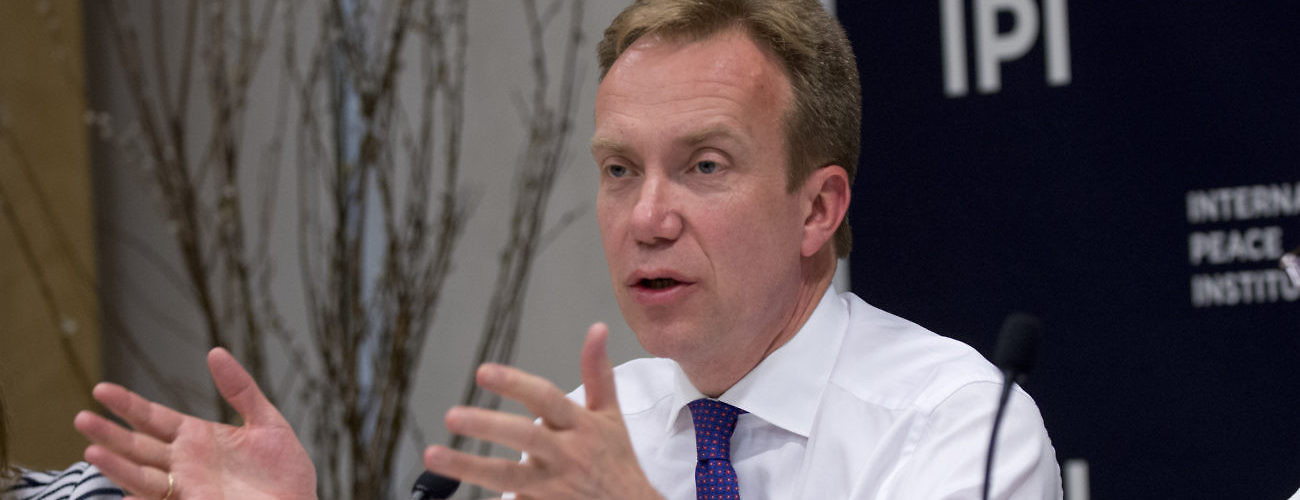Børge Brende, Norway’s Minister of Foreign Affairs, told an IPI audience of a plan to ensure that “new fragile states don’t turn into weaker failed states,” and he said it amounted to “a new kind of Marshall Plan for prevention.”
As such, he said, expects prevention to be the next secretary-general’s “first and foremost” priority.
Brende’s remarks kicked off a high-level forum on “reframing prevention,” at IPI May 11, 2016. Experts including three foreign ministers considered the recommendations of the UN’s three recent peace and security reviews – on peace operations, peacebuilding, and the implementation of the Security Council Resolution 1325 on women, peace, and security. Collectively, the reforms suggested by these reviews sparked a conversation about “prevention” in the diplomatic community, based on the rationale that focusing on prevention rather than crisis response is the only sustainable way to remain cost-effective and efficient.
IPI’s Youssef Mahmoud described the need for a conceptual shift among UN staff and member states in how they understand the organization’s work. Conflict prevention has remained under-prioritized for decades and needs to be brought back to the forefront, he said.
“We tend to look at the world from the high tower of our own village and think we have the right lenses — more importantly we don’t like to change the frames, or challenge our assumptions about reality,” he said. “The UN is self-searching at this moment for change, and one way to stimulate change is to reframe concepts.”
Common interests will enable such a reframing of the UN’s work to be a success, he said. He cited an emerging consensus that “sustaining peace, not resolving conflict,” must be the purpose of UN’s work.
Jeffrey D. Feltman, Under-Secretary-General for Political Affairs, spoke to how the UN Secretariat’s role is central to implement a shift to prevention. “Now is the time to talk about how to translate rhetorical support for prevention into action,” he said.
The UN has bolstered its prevention capacity over the past decade, he said and it now boasts an expert team of mediators who can be deployed anywhere in the world within 72 hours. Another priority has been improving national prevention capacity, which is supported through regional offices and system assistance to country teams, such as the Department of Political Affairs (DPA) partnership with the United Nations Development Programme (UNDP).
The UN member states, he said, must make a financial and political commitment to “place the prevention tools we have on a firmer foundation,” he said.
Feltman clarified that it is his goal to keep a number of emerging conflicts off the agenda of the Security Council, not add to the laundry list of topics for debate. “The point is for the Security Council to concentrate on the crises, and not have to think about the others, because we have prevented them,” he said.
Susana Malcorra, Argentina’s Minister of Foreign Affairs said there is a “dramatic need that the next Secretary-General comes to the office with a compact with member states that is built on trust.” Attributing many issues the organization faces to “weak governance,” she called for a strong leader to shepherd the UN into its next era. Several days after the event she announced that she was a candidate for secretary-general.
Tedros Adhanom Ghebreyesus, Ethiopia’s Minister of Foreign Affairs, said, “When we talk about prevention, there is internal vulnerability of any country—the key.”
By addressing a country’s internal vulnerabilities, “prevention can be properly implemented,” he said.
“The internal problem is more dangerous than any external problem a country faces,” he said. Factors such as geopolitical tensions and proxy war can complicate “not only prevention, but management of any problem.”
Sussan Tahmasebi, Director of the International Civil Society Action Network (ICAN), placed the 2015 review process in its historical context. “The UN has changed as conflict has changed, and is now well positioned to ensure participation of civil society,” she said. Resolution 1325 on women, peace, and security carved out a role for women initially, but its vision is not yet complete, she said. Resolution 1325 and the seven resolutions that followed should be extended “for civil society more broadly,” she said.
Feltman noted the Secretary-General’s “Rights Up Front” campaign’s importance to a prevention-focused UN. By empowering local actors, he said, the UN can become more attuned to early warning signs, and thus prevent conflict. “Abuses of human rights are often a bellwether for something worse that can happen,” he said.
The event was co-hosted by the governments of Ethiopia, Norway, Argentina and the Republic of Korea.
Youssef Mahmoud, IPI Senior Adviser, moderated the conversation.








